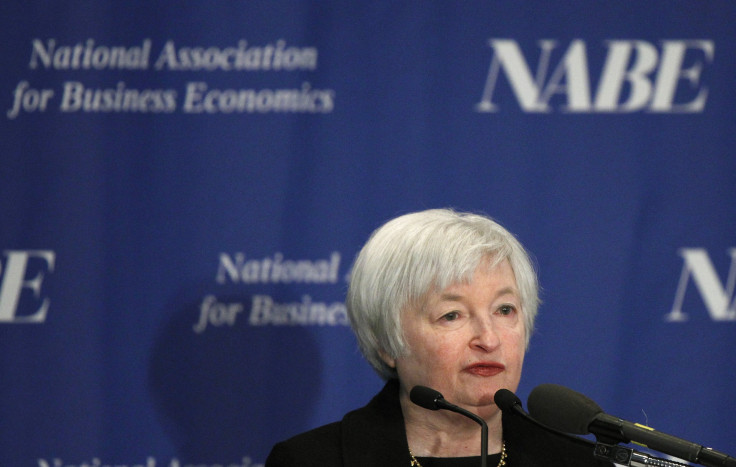Women Holding The Global Purse Strings: Janet Yellen To Make It A Trifecta Of Women Ruling World Economy

Janet Yellen is about to complete a trifecta of women dictating the future of the world’s economy.
Slated to receive the nomination to chair the U.S. Federal Reserve, Yellen – expected to resoundingly win Senate approval for the position – may now leapfrog the likes of former Secretary of State Hillary Clinton and the four women who have sat (three of whom remain) on the Supreme Court to become, as Quartz declared, the most powerful woman in U.S. history.
But in the otherwise male-dominated arena of economics, she will join two other women captaining the titanic global money system.
Eight years after Angela Merkel became the first female German premier, she has won another term as chancellor. But while Germany serves as Europe’s financial anchor, her victory at the ballot box – giving her a third term, albeit with new coalition partners – serves as a testament to her stewardship of her country’s economy.
The austerity measures she has pushed have enriched an already fiscally disciplined Germany. But they have crippled countries on the euro zone’s periphery – countries like Greece that have floundered for years and suppressed violent protests against the government spending cuts made mandatory by Germany.
Critics say she has largely inherited Germany’s economic strength from reforms passed under her predecessor Gerhard Schröder. But as she keeps the continent from buckling under the weight of its own sovereign debts, she remains atop Forbes’ 2013 list of the 100 most powerful women.
Alongside her stands Christine Lagarde, chief of the International Monetary Fund, although the two hardly meet eye to eye.
The two leaders architected of the European Union’s troika, a trio of financial institutions charged with bailing out debt-strapped member states, with opposing visions on how to protect vulnerable economies.
Merkel, a conservative German whose seldom-smiling face exudes an air of Teutonic stoicism and seriousness, urges fiscal unity and discipline. And, in the lead-up to the Sept. 22 election, she was keen to tout her the strength of her domestic economy, and seemed unwilling to contribute more cash to the troika’s coffers.
Lagarde, whose dapper pant suits bespeak her French sophistication, said last year that Europe needed at least – at least -- $1 trillion in emergency funds, and promised to raise more from the IMF’s members.
The conflict between the two leaders became apparent when Lagarde gave a speech at the German Council on Foreign Relations in Berlin in January 2012. After demanding that Germany help the world avert a “1930s moment,” she switched from speaking English to German, and, quoting poet Johann Wolfgang von Goethe, said: “It is not enough to know, we must apply. It is not enough to will, we must do.”
Yellen may provide some common ground between the two women.
Like Lagarde, Yellen appears to support stimulating the economy to spur growth. The IMF predicted on Wednesday that investors could lose as much as $2.3 trillion if the world’s central banks – namely, the Fed – suddenly stopped emergency measures that inject the economy with what Wall Street and Washington like to call “easy money.” Most indicators, so far, prove Yellen would continue the Fed’s $85 billion-per-month stimulus program, known as quantitative easing.
But Yellen’s unique expertise in Europe’s economic history could make her a valuable ally to Merkel. Yellen co-authored a landmark study of East German labor markets in 1991. Merkel was born in Soviet East Germany. Her study “convincingly” demonstrated how workers in the eastern half of the country were priced out of jobs under the terms of German reunification, according to David Marsh, chairman of the Official Monetary and Financial Institutions Forum.
“As Yellen knows, that experience in some important ways mirrors the fate of peripheral euro area countries suffering acute loss of competitiveness and high unemployment after fusing their currencies with Germany’s in 1999,” Marsh wrote in August.
“If both women overcome forthcoming hurdles,” checkmark both Yellen’s nabbing the nomination and Merkel’s seizing the election, “they could have plenty to talk about – and not just economics.”
© Copyright IBTimes 2025. All rights reserved.






















